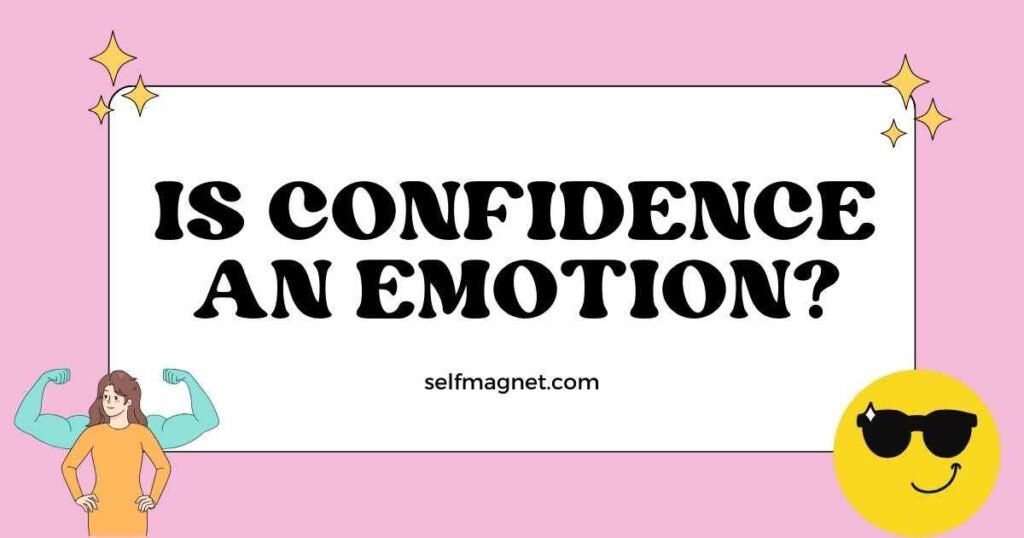Confidence is a fascinating and elusive trait that affects success, relationships, and personal growth. We often hear people say, “Just be confident,” as if it’s a switch we can flick on at will. Is confidence an emotion or a state of mind?
Confidence is an emotion or a mindset that is uncertain. While it shares similarities with emotions, differences in intensity, cognition, neural activity, and self-regulation support the view that confidence is a complex mental concept rather than a pure emotion.
Let’s uncover the layers of this enigmatic quality to reveal its underlying complexities.
But first, let’s start by understanding what emotions are.
The Essence of Emotion

Before we examine confidence, let’s understand what qualifies as an emotion. Emotions comprise physiological, behavioral, and cognitive changes. They are often accompanied by pleasure, sorrow, anger, or fear.
Emotions flow through the essence of our existence. They are temporary, rapidly changing in response to immediate events.
External events, thoughts, and physiological changes play a role in the dynamic nature of emotions. A variety of factors can trigger them, including internal stimuli (such as thoughts or memories) and external stimuli (such as events or interactions with others). This developing quality of human experience influences our connections with others and shapes our perception of the world.
However, confidence doesn’t follow the same pattern as traditional emotions.
Confidence: A Cognitive Foundation
Confidence is often regarded as a belief in one’s abilities or judgment. It’s the inner assurance that helps people overcome challenges independently.
It helps us do what we want, have good relationships with others, and live a happy and fulfilling life.
But what exactly is confidence? Is confidence a separate emotion, or does it relate to other feelings? Let’s discuss to explore this further.
Is confidence an emotion?

This is a question that psychologists have debated for years. Confidence is a feeling of sureness, self-assurance, and belief in our abilities. Some experts believe that confidence is an emotion, while others believe that it is a state of mind.
Before we discover whether confidence belongs in the category of emotions or is treated as a separate psychological construct, let’s analyze the similarities and differences between confidence and emotions.
Common Qualities of Confidence and Emotions
Both emotions and confidence share a number of features that make them related ideas. These similarities complicate defining and distinguishing the two entities.
Here’s a closer look at important converging points:
1. Subjective Experiences:
Confidence, like emotions, is a subjective experience. It differs in intensity and quality among individuals and situations. Confidence is assessing abilities and believing in achieving goals. This self-evaluation can vary from certainty to uncertainty, similar to emotions.
2. Physical Manifestations:
Both confidence and emotions can be physically shown through various bodily responses.
Confidence can manifest in physical signs such as increased heart rate, sweating, and flushed cheeks, resembling the physical response linked to certain emotions.
In addition, confident people may display confident body language, like standing tall, making eye contact, and using expansive gestures, which mirror their inner confidence.
3. Connections to Internal and External Stimuli:
Confidence, like emotions, can be triggered by both external and internal stimuli. Positive feedback, success, or observing confidence in others can enhance self-belief. Similarly, internal thoughts, memories, and self-dialogue have a considerable effect on confidence levels.
Negative self-talk and past failures can lower confidence, but positive affirmations and visualization techniques can increase it.
4. Decision-making and processing interaction:
Both confidence and emotions affect cognitive processes and decision-making. Confidence leads to risk-taking, persistence in challenges, and optimistic approaches.
Likewise, our emotions can affect our thoughts, judgment, and decisions. For instance, the sensation of anxiety can lead to avoidance behavior, whereas the experience of joy can motivate us to pursue new prospects.
5. Shared Neural Substrates:
Research suggests that confidence and emotions are connected through neural pathways in the brain. Brain regions associated with reward processing, motivation, and self-evaluation are activated during both emotional experiences and states of confidence.
This shared neural basis further strengthens the connection between these two psychological constructs.
6. Difficulty in Clear Differentiation:
Confidence and emotions can be difficult to distinguish. While emotions are typically brief and intense, confidence is more stable and less volatile.
Additionally, confidence is often perceived as a cognitive assessment, while emotions are generally associated with physical changes and subjective feelings.
However, it is not always easy to differentiate between these concepts, and the relationship between confidence and emotions is a complex area to explore.
By acknowledging the common characteristics of confidence and emotions, we can attain a deeper understanding of how they shape our thoughts, behaviors, and overall well-being. But why do some experts not consider confidence an emotion?
Confidence versus Emotions
While some argue that confidence is like emotions, others object to this notion based on key factors. Here’s a breakdown of the arguments against classifying confidence as an emotion:
1. Intensity and Fleetingness:
Emotions are intense and transient. They can suddenly arise and subside, quickly changing in response to stimuli. Confidence tends to be more consistent and resistant to sudden shifts and is generally considered a more stable and sustained psychological state.
2. Relationship to Self-belief and Self-efficacy:
Proponents of the “non-emotion” perspective view confidence as tied to self-belief and self-efficacy, not as an emotion. Self-belief is the conviction in abilities; self-efficacy is the belief in succeeding in tasks.
These cognitive assessments contribute to confidence. They are not emotions, as they lack intense subjective feelings and physiological changes.
3. Focus on Cognitive Assessment:
Confidence values cognitive assessment over immediate subjective experiences, unlike emotions. Confidence involves positive feelings, but the focus is on evaluating one’s abilities and resources.
This cognitive focus separates confidence from pure emotions, as immediate feelings and physiological responses primarily drive pure emotions.
4. Distinctive Neural Activity:
Emerging research shows that confidence and emotions engage distinct neural pathways, supporting their separate nature. While some neural circuits overlap, confidence involves self-evaluation and decision-making areas, while emotions engage emotional processing and reward systems. This supports the idea that confidence and emotions have separate neural underpinnings.
5. The Role of Self-regulation:
Confidence can be developed through strategies like Encouraging self-talk, visualization, and defining goals. The ability to self-regulate confidence differentiates it from emotions, which are often more automatic and difficult to control. The conscious effort and cognitive process in building and managing confidence differentiate it from pure emotions.
7. Goal-oriented Focus:
Confidence is usually directed at specific goals. It fuels motivation and self-belief for desired outcomes. In contrast, emotions are not necessarily tied to goals or achievements.
8. The Influence of Past Experiences:
Past experiences play a major role in shaping one’s confidence level. A history of successes boosts confidence, while failures decrease self-belief. Experiences less influence emotions and are often triggered by immediate stimuli without strong connections to the past.
9. The Role of Social Comparison:
Social comparison greatly affects confidence levels. Comparing oneself to others can decrease self-belief. Conversely, seeing others succeed can sometimes provide the inspiration and motivation to achieve similar outcomes. This influence of social comparison is less dominant with emotions, which are primarily driven by internal feelings and individual experiences.
10. The Importance of Context:
Confidence can fluctuate based on the context and situation. One’s confidence can be strong in one area but weak in another. The context-dependent nature of confidence sets it apart from more universal emotions.
11. The Relationship to Self-esteem:
Confidence and self-esteem are closely correlated but separate principles. At the same time, confidence is primarily concerned with the belief in one’s abilities, self-esteem, and worth and value. Self-esteem and confidence are similar but not interchangeable.
Understanding these additional points allows us to gain a more comprehensive understanding of the relationship between confidence, emotions, and their impact on our experiences and behavior.
By recognizing the unique qualities of these constructs, we can empower ourselves to cultivate confidence and harness its positive impact on our lives. It’s important to manage emotions effectively to achieve well-being and personal fulfillment.
So, the answer to whether confidence is an emotion or a state of mind is unclear. Confidence may be a complex construct with traits of both emotions and states of mind.
Next, we will explore confidence and emotion dynamics.
The Interplay: Harmony Between Confidence and Emotion
In human psychology, confidence and emotion are crucial for shaping our responses.
Acknowledging the interplay of confidence and emotion is essential for self-comprehension.
It is essential to maintain a well-rounded view of these constructs.
Confidence as a Stabilizing Force
Confidence stabilizes the interplay of these psychological constructs. As a psychological anchor, confidence provides resilience during emotionally charged situations. It acts as a buffer, allowing people to tackle challenges with self-assuredness.
Emotions as a Barometer of Confidence
Emotions, in turn, serve as a barometer of one’s confidence. They reveal insights into how our self-perception aligns with our immediate emotional experiences. The comprehension of this interplay fosters emotional intelligence, enabling a deeper understanding of oneself.
Key Takeaways
Stated below are some significant highlights:
- 1. Uncertain Nature: The classification of confidence as an emotion or a state of mind is unclear and subject to ongoing debate in psychology.
- 2. Complex Construct: Confidence is considered a complex mental concept with traits of both emotions and states of mind, sharing similarities with emotions but differing in intensity, cognition, neural activity, and self-regulation.
- 3. Commonalities and Differences: Both emotions and confidence share subjective experiences, physical manifestations, and connections to stimuli. However, confidence is more stable, less volatile, and often perceived as a cognitive assessment.
- 4. Interplay Between Confidence and Emotion: Acknowledging the interplay between confidence and emotion is crucial for self-comprehension, with confidence acting as a stabilizing force and emotions serving as a barometer of one’s confidence.
Confidence is a fusion of emotion and mindset, defined by personal feelings and neural connections.
The ongoing debate in psychology, including the question “Is confidence an emotion?” highlights the call for more research to ascertain the exact nature of confidence and its relationship to emotions.
The classification of psychological phenomena, including emotions, is difficult and continues to be discussed and refined.
Gaining insight into different perspectives enhances our understanding of human behavior.
FAQ
References:
Mindset: The New Psychology of Success by Carol Dweck: https://ctl.stanford.edu/growth-mindset
Learned Optimism by Martin Seligman: https://www.pursuit-of-happiness.org/history-of-happiness/martin-seligman-psychology/
How Emotions Are Made: The Secret Life of the Brain by Lisa Feldman Barrett: https://www.amazon.com/How-Emotions-Are-Made-Secret/dp/1469292084
Katty Kay and Claire Shipman’s website: https://www.kayandshipman.com/
The Confidence Code for Girls: https://www.confidencecodegirls.com/
12. Консультация юриста по налоговому праву: все, что нужно знать
вопросы юристам [url=https://dontimes.news/kljuchevye-aspekty-pravovyh-konsultacij-chto-nuzhno-znat-po-mneniju-jurista.dhtm]вопросы юристам[/url] .
This is an excellent analysis that delved into the multifaceted nature of emotions and feelings that effect or are effect by them. In truth, there are aspects I never considered, and I thank you for offering such a brilliant paper regarding the complexities involved. Finally, it’s good to know that my layman’s assessment (posted on MeWe) was actually validated as part of the wider narrative provided in the text.
I appreciate your kind words and am pleased to hear that the analysis resonated with your own perspectives. If you have any related questions, feel free to share.